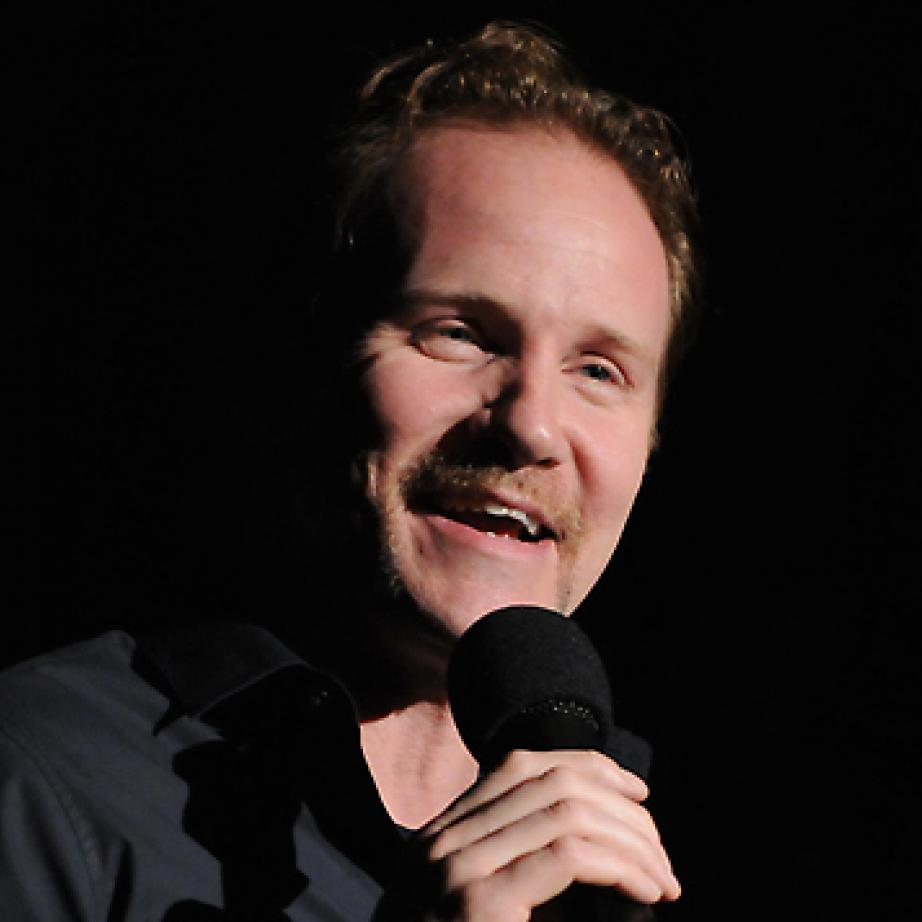Friday, Mar 26, 2010
Director and documentarian Morgan Spurlock earned plenty of acclaim for his 2004 feature Super Size Me, but it came at a “heavy” cost – literally. Spurlock gained 25 pounds over the course of a month and his cholesterol skyrocketed. In fact, his doctors were so concerned about his spiraling health that they asked him to stop filming his documentary about the McDonald’s fast-food chain. The results, they feared, could be permanently damaging.
“I called my mom, and she said, ‘There’s a fine line between bravery and stupidity,’” Spurlock said. “I told her, ‘I know, Mom. I walk that fine line every day.”
The award-winning writer, director and producer gave a lecture on March 9 on the Lawrenceville campus. The event was professionally taped and portions of the lecture will be featured in the extras section of the fifth anniversary DVD of Super Size Me, which will be released this summer.
When you hear about Spurlock’s deteriorating health, you might just wonder why he would allow himself to consume a strict diet of Mickey D’s for one month and limit his exercise to the amount of exercise of an “average” American. However, when Spurlock first envisioned the idea of the documentary, he didn’t think he would have the leading role.
“Originally, I wanted to have someone else to do it,” he told the capacity audience inside the Bart Luedeke Center Theater. But, then he thought that person might try sneaking broccoli on the side. “I wanted it to be 100 percent true, so I did it myself. I became my own guinea pig.”
Spurlock said he came up with the idea for documentary after Thanksgiving dinner at his mother’s house in 2002. Full from eating turkey, stuffing, gravy and all the “trappings” of the meal, Spurlock was laying on the couch watching television. He saw the news story about two overweight girls, who were suing McDonald’s because of the effects of its fat- and sodium-drenched food on their heath.
“They were suing the place where they ate. I thought that was crazy – nuts,” he said. “I’m a big believer in personal responsibility. I live in New York City. I ride my bike everywhere. I’ve been hit by buses, cabs. I know I can’t go around blaming everybody because it comes down to personal responsibility.”
Still, Spurlock was amazed to hear a spokesperson of McDonald’s deny the claims by saying that the food was healthy.
“Then, a light went on and I turned to my girlfriend and said, ‘Baby, I got a great idea for a movie,” he recalled. “Then I called my best friend, Scott. After he finished laughing, he said, ‘Wow, that’s a really great, bad idea.”
What was a “really great, bad idea” turned into a global phenomenon. Super Size Me played to audiences in more than 100 countries, changed school lunch programs across the nation, empowered millions of people to change their own eating habits, and eliminated Super Size options from the world’s largest fast-food chain. The film was also used by senators, congressmen and lobby groups nationwide as a call to action for multiple food- and education-related causes. The film won Best Directing honors at the Sundance and Edinburgh film festivals, as well as the inaugural Writers Guild of America documentary screenplay award and an Academy Award nomination for Best Feature Documentary.
“I was dumbfounded by the way that the movie exploded,” Spurlock said. “When the movie premiered at the Sundance Film Festival in January 2004, I was just excited that someone sold it.”
While the documentary had a huge following, Spurlock said there were also a lot of attacks. Some critics wanted to know why he specifically focused on McDonald’s in the film and not other fast food chains, such as Burger King and Taco Bell.
“Why pick on McDonald’s? It’s the biggest fast-food chain. It feeds more than 45 million people a day. There are 35,000 restaurants, across six countries. Antarctica is the only place without a McDonald’s,” he said. “McDonald’s franchises this all-American eating all around the world and has this ability to influence everyone.”
In addition to Super Size Me, Spurlock has also produced the critically acclaimed FX program, 30 Days, which ran for three seasons and dealt with such polarizing issues as the minimum wage, prison reform, abortion and gun control. Spurlock, who was rejected from film school five times before being accepted to New York University, said he is fortunate to go to work every day being able to tell stories that he wants to tell.
Once the filming of the documentary for Super Size Me ended, Spurlock immediately started a diet, which consisted of no meat, no dairy and no caffeine. He lost 10 pounds during the first eight weeks of the diet. Over the course of 14 months, Spurlock lost all 25 pounds that he had gained during the filming of the documentary. While his mouth still waters when he sees a McDonald’s commercial, Spurlock said he has kicked the habit – cold turkey.
“I haven’t stepped foot in a McDonald’s since March 2, 2003,” he said. “I love a good burger, but I prefer the mom-and-pop places.”
Willie Emanuele, a freshman Computer Information Systems major, introduced the audience to Spurlock at the University event.
“He’s proof that a man and one outlandish idea can make a difference,” said Emanuele about Spurlock.

